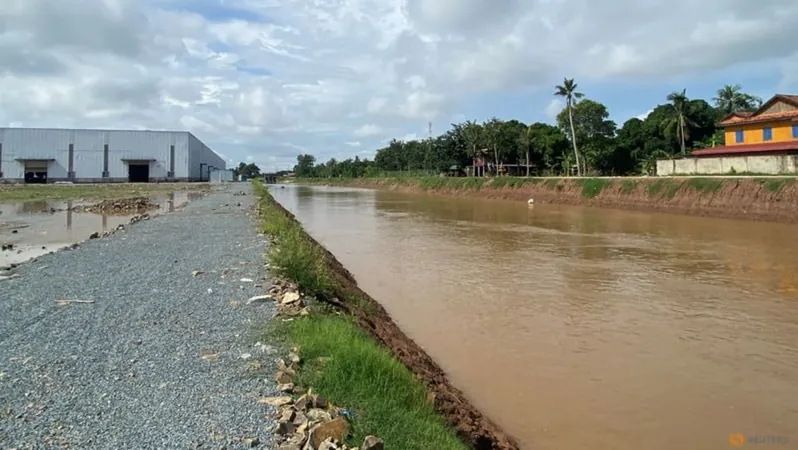
Cambodia's Ambitious Canal Faces Uncertainty as Chinese Funds Stall
2024-11-23
Author: John Tan
Introduction
PHNOM PENH: In a grand ceremony last August, Prime Minister Hun Manet knelt in reverence before saffron-robed monks, fireworks lighting up the sky as he symbolically broke ground for the ambitious Funan Techo Canal. This project, aimed at reshaping Cambodia's economic landscape, promises to connect the Mekong River to the Gulf of Thailand, significantly reducing the country's dependence on maritime routes through Vietnam.
China's Financial Role
Hun Manet announced that China would play a crucial role in funding the US$1.7 billion project, which represents nearly 4% of Cambodia’s annual GDP. However, just months later, critical funding from Beijing is shrouded in uncertainty. Sources reveal that Chinese officials harbor doubts about the project, prompting a worrying lack of definitive financial commitments.
Response from Chinese Officials
The Chinese Foreign Ministry responded ambiguously to inquiries about the canal's funding, emphasizing the enduring friendship between China and Cambodia, yet avoiding specifics. Following this, Cambodia’s Public Works Ministry refuted concerns raised by international media, claiming that project implementation was proceeding smoothly without any mention of Chinese financial support.
Concerns from Experts
Experts warn that China's withdrawal of financial backing could endanger the entire canal initiative due to the unclear cost estimates, environmental implications, and overall financial sustainability. As China recalibrates its overseas investments amid domestic economic challenges, it seems to be reducing its financial footprint even in strategic partnerships such as with Cambodia.
Historical Context and Debt
Historically, Cambodia has been viewed through the lens of post-civil war reconstruction, receiving substantial Western support. However, recent years have seen it increasingly perceived as a client state of China, with over one-third of its national debt owed to Beijing. Despite this bond, investments from China have dropped precipitously following a series of unprofitable infrastructure ventures and rising crime against Chinese nationals.
Project Details and Funding Confusion
The proposed 180km canal would expand an existing waterway, yet doubts shroud the nature of Chinese involvement. While the Minister for Public Works initially stated that the China Road and Bridge Corporation (CRBC) would fully finance the project, Hun Manet later disclosed a 49% funding share from CRBC, which has led to confusion regarding ownership stakes.
Current Status of Construction
Despite the declarations of progress, as of now, construction has stagnated, with the site of the ceremony appearing abandoned. The Cambodian government faces hardship as projections indicate a significant drop in Chinese official development assistance; from $420 million in 2021, it is expected to plummet to $35 million by 2026 with no new loans issued in the first half of this year.
Investment Landscape Shift
While Chinese investments in Cambodia remain notable, the landscape is shifting. The phasing out of support for major infrastructure projects, including the Phnom Penh airport, reflects a broader pattern of withdrawal. Prominent analysts emphasize that falling investments and muted tourism growth in the wake of the COVID-19 pandemic have raised alarms about the project’s viability.
Investor Sentiments
As speculation surrounds the canal, expert Brian Eyler of the Stimson Center articulates that the plethora of uncertainties will likely deter investors who are hesitant to commit their funds until better clarity emerges.
Conclusion
With Cambodia's future economic ambitions hanging in the balance, the fate of the Funan Techo Canal may often reflect the changing priorities of China and the shifting contours of regional investment. The increasing apprehension from investors highlights a tumultuous chapter in Cambodia's quest for economic independence and infrastructural development.

 Brasil (PT)
Brasil (PT)
 Canada (EN)
Canada (EN)
 Chile (ES)
Chile (ES)
 España (ES)
España (ES)
 France (FR)
France (FR)
 Hong Kong (EN)
Hong Kong (EN)
 Italia (IT)
Italia (IT)
 日本 (JA)
日本 (JA)
 Magyarország (HU)
Magyarország (HU)
 Norge (NO)
Norge (NO)
 Polska (PL)
Polska (PL)
 Schweiz (DE)
Schweiz (DE)
 Singapore (EN)
Singapore (EN)
 Sverige (SV)
Sverige (SV)
 Suomi (FI)
Suomi (FI)
 Türkiye (TR)
Türkiye (TR)